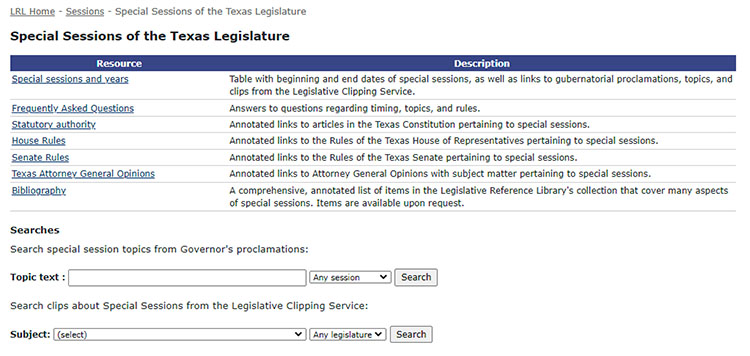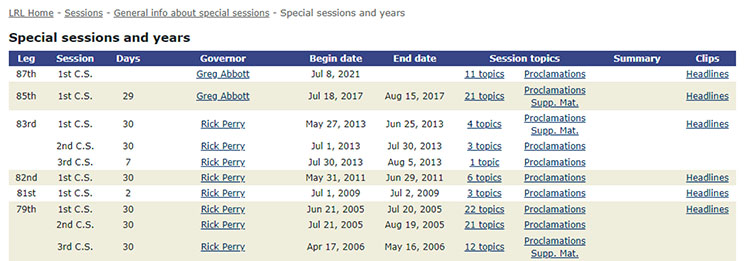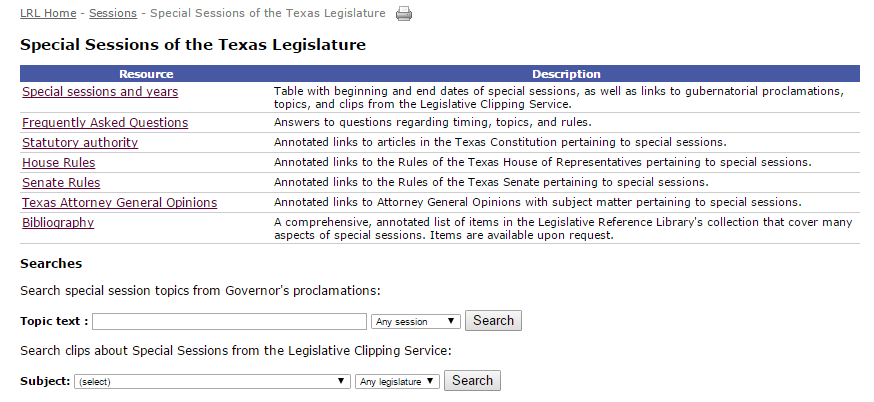The 1st Called Session of the 82nd Legislature begins today. Below you will find answers to frequently asked questions regarding special sessions. For a list of all special sessions and dates, see the library's Special Sessions and Years page.
Does the Governor have to wait twenty days after the end of the regular session before calling a special session?
No. Texas Constitution, Article 4, Section 8(a) does not place time limits on the Governor's power to convene a special session, nor does it include a requirement that he or she provide advance notice of his or her intention to call a special session. The Constitution states, "The Governor may, on extraordinary occasions, convene the Legislature at the seat of Government, or at a different place, in case that should be in possession of the public enemy or in case of the prevalence of disease threat. His proclamation therefore shall state specifically the purpose for which the Legislature is convened."
The interpretive commentary following Article 4, section 8 in Vernon's Constitution of the State of Texas Annotated explains: [The Governor] "may call at any time and for any reason, although he must state his purpose the proclamation."
How many other times has the special session convened the day after the close of a regular session?
In addition to the 82nd, 1st Called Session, six other special sessions have convened the day after the close of the regular session: the 1st Called Sessions of the 25th, 28th, 38th, 62nd, 69th and 70th Legislatures. Three special sessions have convened on the last day of the regular session: the 1st Called Sessions of the 29th, the 30th and the 31st Legislatures.
Can the Legislature consider any topic during a special session?
No. Article 3, Section 40 of the Texas Constitution states that when the Legislature is convened in special session, there shall be no legislation upon subjects other than those designated in the proclamation of the Governor calling such session, or presented to them by the Governor.
An extensive discussion of this issue can be found in the Senate Rules of the 82nd Legislature, Appendix.
Can more than one topic be covered in a special session?
Texas Constitution, Article 3, Section 40 places no limitation on the number of topics a Governor can designate in a special session proclamation. All topics need not be listed in a single proclamation; the governor may expand his/her call to include additional topics at any time. As an example, legislation was allowed on 240 topics during the 36th Legislature, 2nd Called Session and 165 topics during the 35th Legislature, 4th Called Session.
Do special sessions have to last 30 days?
No. Texas Constitution Article 3, Section 40 limits special sessions to a maximum of thirty days but imposes no minimum.
Is there a limit on the number of special sessions that can be called between regular legislative sessions?
No. The Texas Constitution does not limit the number of special sessions a governor may call in between two regular legislative sessions.
Does there have to be a break between special sessions?
No. The governor may call special sessions back-to-back. As an example, the 1st Called Session of the 79th Legislature ended on July 20, 2005 and the 2nd Called Session began on July 21, 2005.
The governor may also convene a new special session on the same day that a special session ends. As an example, the 1st Called Session of the 78th Legislature ended on July 28, 2003 and the 2nd Called Session began at 3:15pm the same day.
How long after a special session ends does the Governor have to veto bills?
Texas Constitution, Article 4, Section 14, which grants the Governor the power to veto bills, draws no distinction between regular and special sessions.
If a bill is presented to the Governor fewer than 10 days (not counting Sundays) prior to final adjournment, the Governor has 20 days (counting Sundays) after the final day of the session to sign or veto it. If neither action is taken, the bill becomes law without the Governor's signature (Texas Constitution, Article 4, Section 14).
If a bill is presented to the Governor prior to the final ten days of session (not counting Sundays), the Governor has 10 days (not counting Sundays) to return the bill to the Legislature with objection. If after 10 days the bill is not returned to the Legislature by the Governor with objections, the bill becomes law as if the Governor had signed it.
Vetoes going back to the 1st Legislative Session are available on the library's Vetoed Bills page.
Can the Legislature override a veto of a regular session bill during a special session?
There is some debate over this matter, however the 1875 Constitutional Convention removed the ability for the Legislature to consider veto items from a previous session.
References:
Postadjournment Veto (In Texas Legislative Council, Gubernatorial Veto: Powers, Procedures, and Override History (May 22, 1990), pp. 11-12).
George D. Braden, et al., The Constitution of the State of Texas: An Annotated Comparative Analysis (1977), pp. 333-334.
Texplainer: Can a Veto Be Overturned After Sine Die?, Texas Tribune, retrieved 6/8/2011.
What was the shortest special session? What was the longest?
The 1st Called Session of the 38th Legislature met for only one hour. No legislation was enacted. The 1st Called Session of the 12th Legislature met for 112 days, longer than any previous or subsequent special session.
Which legislative session has had the most called sessions?
Between 1989-1990, Governor Bill Clements called six special sessions of the 71st Legislature to consider over 100 items.
Where can I see topics covered in previous special sessions?
Special session topics are available on the library's Special Sessions and Years page. Special session topics can be searched by keyword from the library's Special Sessions page.
This entry was posted on May 31, 2011 at 9:21 AM and has received 10927 views.
Print this entry.




